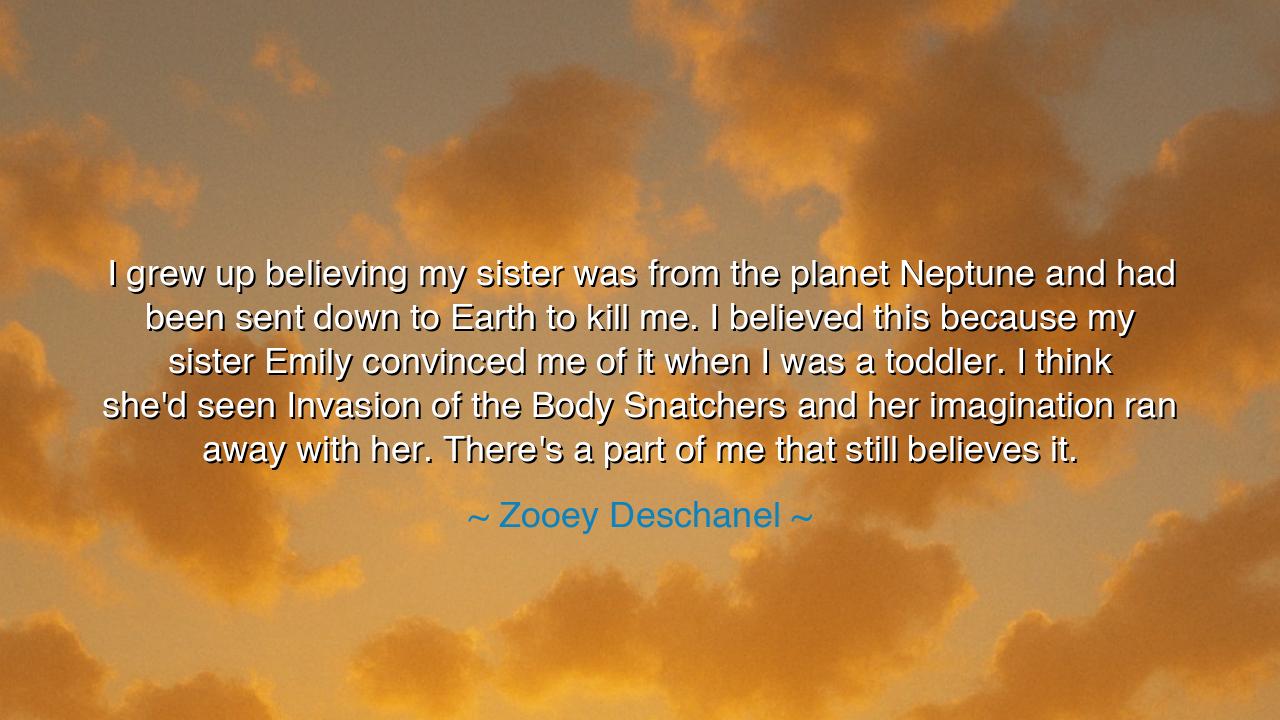
I grew up believing my sister was from the planet Neptune and had
I grew up believing my sister was from the planet Neptune and had been sent down to Earth to kill me. I believed this because my sister Emily convinced me of it when I was a toddler. I think she'd seen Invasion of the Body Snatchers and her imagination ran away with her. There's a part of me that still believes it.






The words of Zooey Deschanel — “I grew up believing my sister was from the planet Neptune and had been sent down to Earth to kill me. I believed this because my sister Emily convinced me of it when I was a toddler. I think she’d seen Invasion of the Body Snatchers and her imagination ran away with her. There’s a part of me that still believes it.” — are at once humorous and profound. Beneath the laughter lies a timeless truth about the power of imagination, the innocence of childhood belief, and the strange endurance of the stories we first learn to trust. In these words, Deschanel does not merely share a memory — she reveals how the myths of childhood shape the mind, blurring the borders between fantasy and reality, affection and fear, the real and the remembered.
Every person begins life as a dreamer. Before logic teaches the laws of the world, imagination is the only law we know. To a child, every shadow hides a mystery, every face conceals a secret, every story might be true. Thus, when Zooey’s sister Emily spun her tale of alien origins — inspired, perhaps, by the eerie film Invasion of the Body Snatchers — the young Zooey believed it with the unquestioning faith only a child possesses. It was not simply gullibility, but an expression of the child’s deepest gift: the ability to imagine without limit. The imagination, once awakened, does not distinguish between the possible and the impossible; it breathes life into both.
The ancients understood this power well. They told their children that gods walked among men, that thunder was the voice of Zeus, that the stars were the eyes of ancestors watching from the heavens. These tales were not lies, but mirrors of the mind — tools by which young souls learned to see meaning in chaos. In the same way, Zooey’s belief in her sister’s cosmic identity was a child’s version of myth-making: a playful terror that gave shape to wonder. For to a child, imagination is not an escape from the world, but the way in which the world is first made real.
And yet, as Deschanel admits, “There’s a part of me that still believes it.” This confession carries a secret wisdom. Though reason may grow and knowledge expand, the mythic imagination of childhood never fully dies. It lingers in the corners of the adult mind, whispering possibilities that logic cannot silence. It is the same spark that moves poets to write of invisible worlds, scientists to dream of life beyond the stars, and lovers to believe in destiny. To retain a piece of that childlike wonder is to remain forever capable of awe. Without it, the world becomes flat — all fact, no magic.
Consider the story of Albert Einstein, who as a boy watched a compass needle tremble and wondered what unseen force moved it. That single moment of imagination — the ability to believe that invisible powers might rule the visible world — led to the birth of modern physics. Einstein never lost his sense of wonder. He once said, “Imagination is more important than knowledge, for knowledge is limited, while imagination encircles the world.” In this, he echoed the same truth that Deschanel’s anecdote playfully embodies: that imagination, once ignited, can shape the course of a life.
There is also a tender lesson here about siblinghood and storytelling. In their playful deception, Emily was not merely tormenting her younger sister — she was initiating her into the sacred realm of story. Every family carries its legends: tales of mischief, secrets, and shared laughter that bind hearts more tightly than truth ever could. Through her sister’s tale, Zooey learned not only fear, but fascination — the ability to believe, to suspend disbelief, to feel the pulse of wonder beneath ordinary life. That power, born in childhood, later blossomed into her own creative spirit as an actress, musician, and storyteller.
Let this be the lesson for all who listen: do not despise the stories that shaped your youth, even the foolish or the fantastic. They are the seeds of your imagination, the first fires of your creativity. Reason may refine them, but never seek to extinguish them. The world needs both the clear eye of truth and the wild heart of imagination — for without one, we are lost in delusion; without the other, we are lost in despair. Hold fast to both. Remember that a part of you, too, still believes in Neptune, in magic, in the impossible — and that belief is not weakness but strength.
For as the ancients would say, the child within us is the last link to the divine. To believe, even playfully, in what cannot be seen is to honor the creative spark that birthed the stars themselves. Therefore, nurture your imagination, but temper it with wisdom; cherish your myths, but walk in truth. And when you find yourself laughing at the old stories — as Zooey does — remember that laughter itself is sacred, for it is the song of one who still remembers the time when all things were possible.






AAdministratorAdministrator
Welcome, honored guests. Please leave a comment, we will respond soon